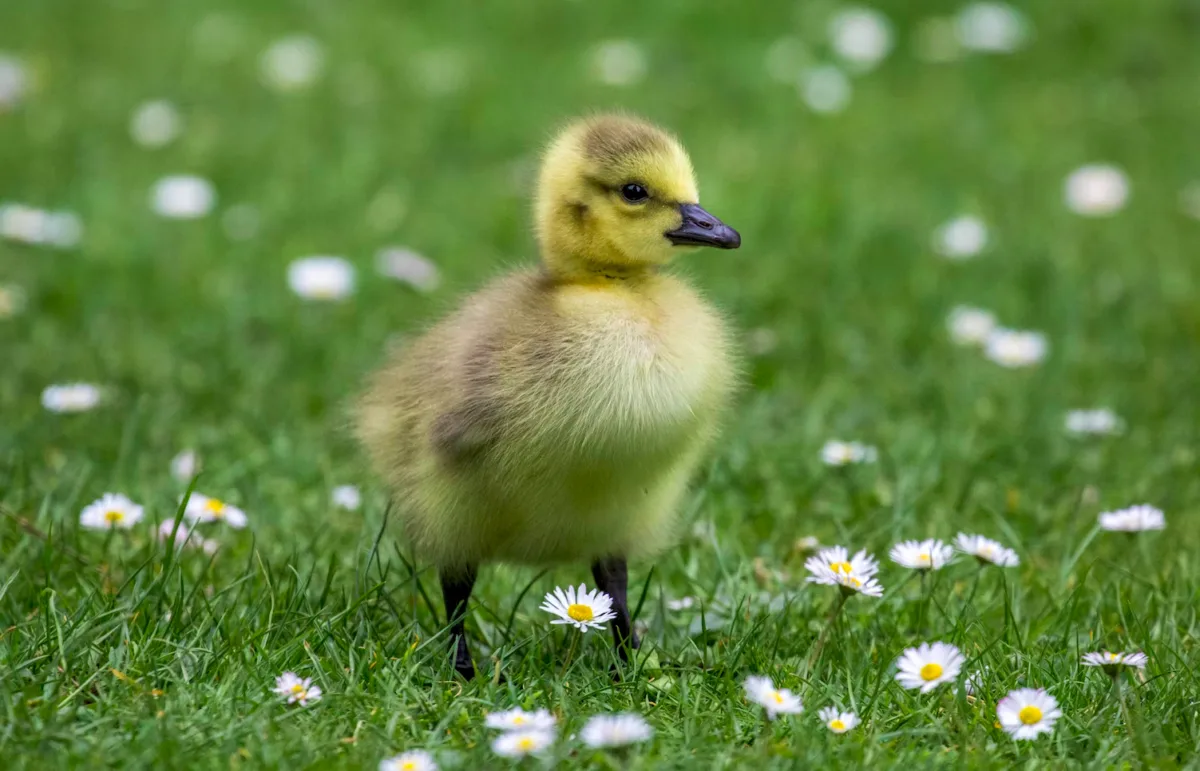Thinking Of Adopting Ducklings? Well, then, you’re in the right place to learn more!
The adorable baby ducklings are love at first sight and melt your heart instantly. If you are thinking of getting a pet baby duck then this article is going to be an interesting read!
Baby ducks are incredibly endearing and exhibit lots of love – the kind only animals can give. Not only do they express themselves in unique ways, but they make a great addition to any family who has space enough for them!
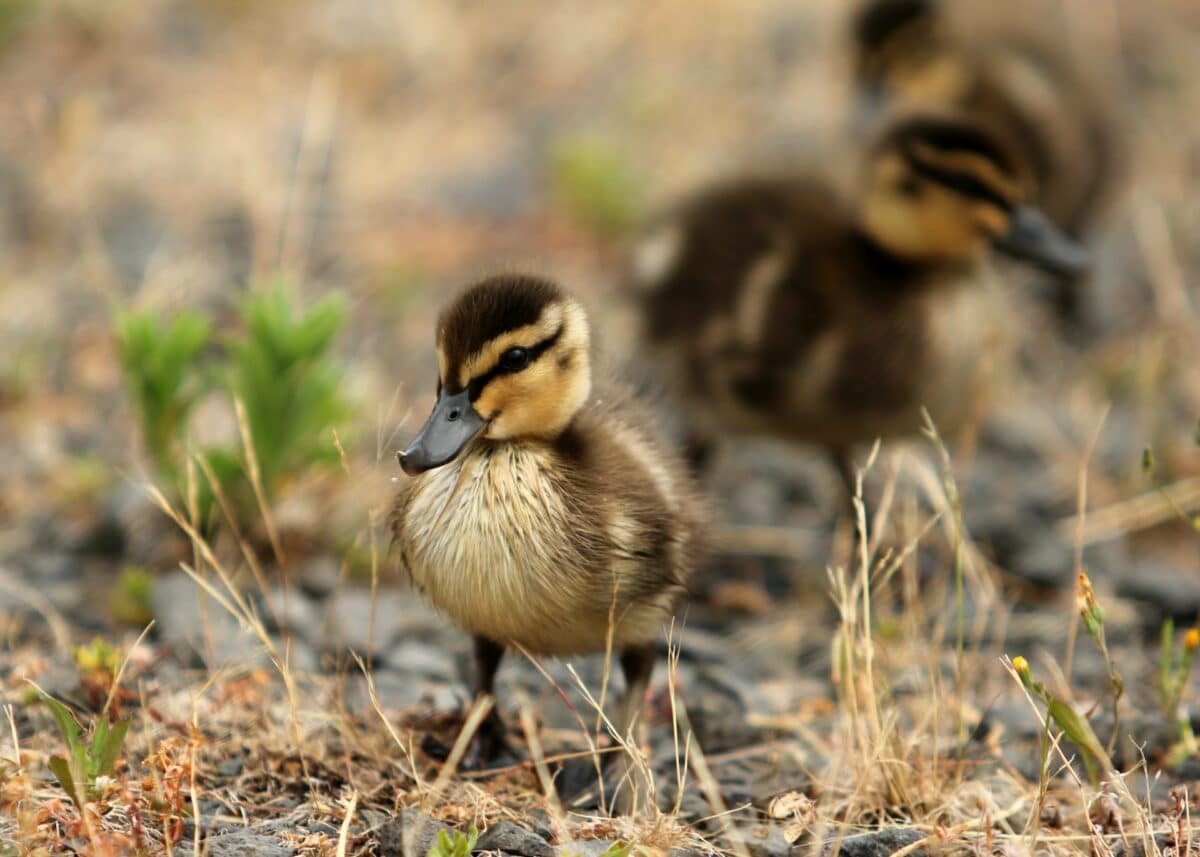
Whether you’re an experienced duck owner or just considering adoption, this blog post will go through the basics about caring for baby ducks and cover some tips & tricks that ensure your little fluffers stay healthy and happy.
Interested in another baby bird’s journey – The Young Swan?
Want to jump ahead? Click below
Getting To Know The Baby Ducks

Ducklings, the adorable offspring of ducks, are miniature replicas of their adult counterparts. These tiny feathered creatures start their journey in life with a fluffy and endearing appearance, even as young as two to three days old.
Their coloration can vary from pristine white to earthy brown, with the most common feature being black spots. These charming ducklings often huddle together in a tight-knit cluster and emit vibrant chirping sounds as they take their first wobbly steps to explore their surroundings.
While they may possess an innate attraction to water, ducklings depend on parental guidance and instruction before taking the plunge into a pond or lake. Without this crucial guidance, they may exhibit reluctance when it comes to swimming.
In essence, baby ducks, or ducklings, are irresistibly cute creatures that bring delight to anyone who observes their early adventures, all under the watchful eye of their devoted mother.
Overview Of The Adorable Features Of A Duckling
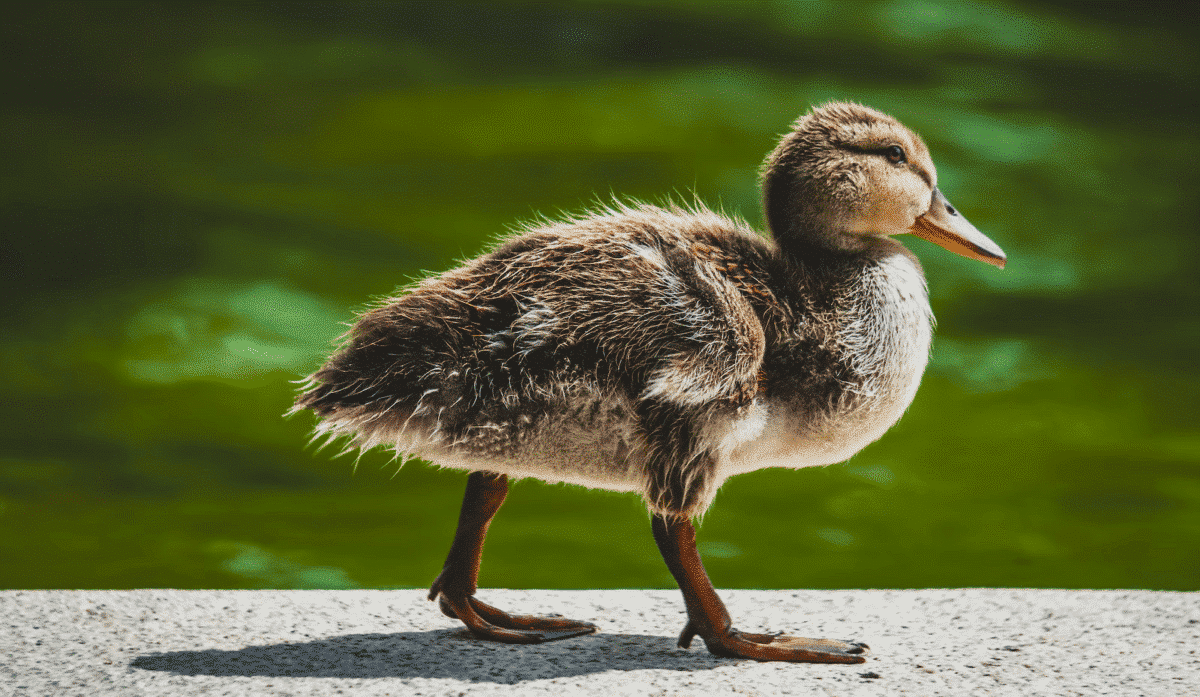
Baby ducks, or ducklings, are small and adorable little creatures. They are usually a deep golden yellow with black stripes on their heads and backs when hatched from the egg. As the duckling matures, its feathers will start to grow and replace the downy fluff that once covered its body.
Feathers
Baby ducks have soft, glossy feathers that vary in color depending on the breed. When healthy, ducks have soft, shiny feathers that give them a smooth look – perfect for petting!
Body Shape
They have short wings with a wide body shape and a long tail feather that drags behind them as they walk. Their legs are short and stout, which makes them appear almost comical when walking.
Size
Their size varies depending on the breed of the duckling, but generally speaking, they range from 4 to 10 inches tall when fully grown. Ducks have webbed feet that allow them to paddle through the water quickly, adding an extra layer of cuteness to their appearance as their feet look like paddles floating in water!
Facial Features
Duckling’s eyes vary in color between yellow, orange, and blue depending on the breed of duck they come from, but all have large eyes surrounded by white feathers and lids that typically close while swimming or sleeping. Ducklings also have an impressive array of facial expressions, including smiling at their owners or scowling when angry, which is hilarious and endearing.
Beaks
When baby ducks hatch from the egg, their beaks are typically grayish-white in color but will change shades over time until they turn into a darker shade of either gray or even black depending on the breed of duck, it’s a feature that’s inherited. They use their beaks for food, preening themselves, and swimming (using them like a rudder).
Distinct Markings
Each baby duck has unique markings that help with identification in large groups.
Overall Charm
Baby ducks have an undeniable charm that brings a smile to anyone’s face.
Additionally, each baby duck has distinct markings that can be noticed up close, which helps parents and experts identify the unique individual ducklings in a large group. All in all, baby ducks have an unmistakable charm that makes it hard not to smile when seeing one.
Identifying Baby Ducks: How To Tell If A Duck Is A Baby Or Not?
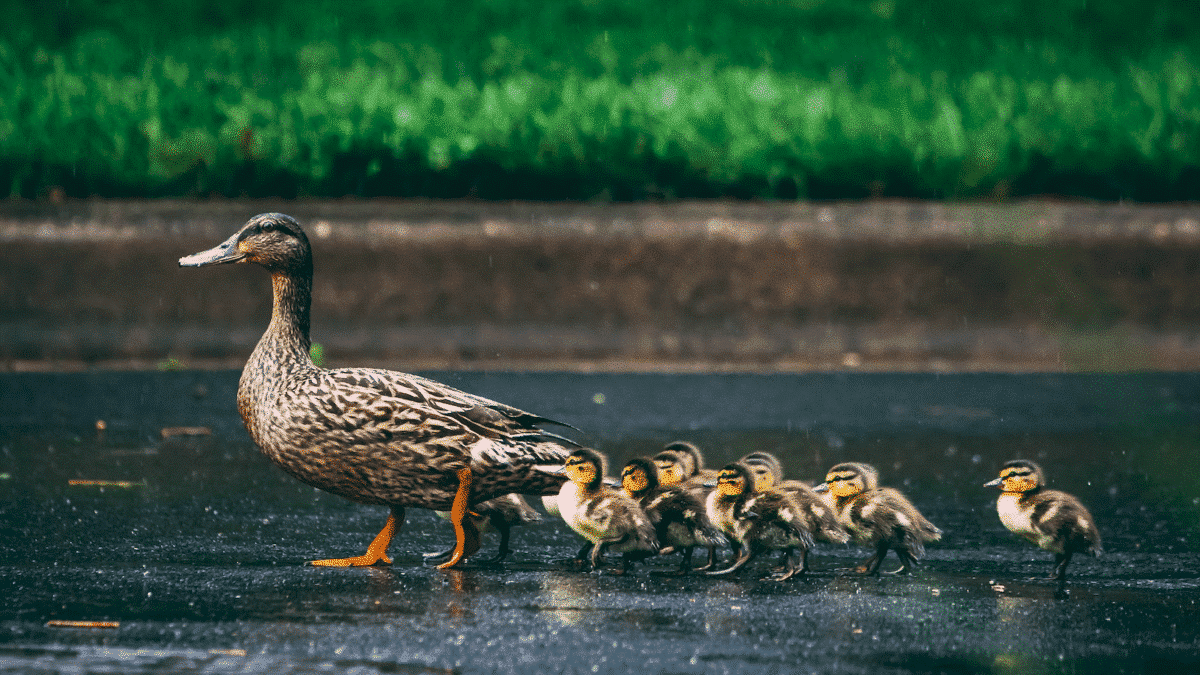
If you are trying to determine whether a duck is a baby, there are several clues you can look for, such as:
- Baby ducks usually have brown or gray feathers with streaks or spots instead of the distinctive pattern of an adult duck.
- They tend to be smaller than their fully grown counterparts yet often appear more prominent due to all their fluff.
- Their bills will be shorter and less pointed than an adult’s, plus they have a much softer chirp compared to the quack of an adult duck.
With these clues in mind, it should be relatively easy to tell whether your local ducks are babies!
What Do You Need To Take Care Of Baby Ducks?
Taking care of baby ducks is rewarding, but it does come with some responsibility. Like any animal, you’ll need to provide for their basic needs, like food and shelter.
- It’s important to give them a safe space away from predators, cold drafts, or heavy rains.
- You’ll need to create an area in which they can stay warm and dry, preferably with a source heat lamp or heating pad.
- It would help if you also introduced them to a protein-rich diet by providing a balanced mixture of duck pellets and other grains.
- Keeping their living space clean is essential for their health, so keep the bedding area maintained and cleaned regularly.
As long as these needs are met, your baby ducks will be well on their way toward growing into healthy adults!
Development Stages of Baby Ducks
Baby ducks undergo a complex development process that starts before they hatch.
- The process begins when the mother duck lays eggs, which will incubate for about 30 days.
- During this time, the embryos undergo cellular division and develop their feathers and other body parts.
- After about 28 days of incubation, baby ducks will begin to tap inside the eggshells with an egg tooth to crack it open!
- After hatching from the eggs, ducklings are ready to take on the world and start their lives.
- The young ducks will immediately try to stand up on their own two feet, and they can walk surprisingly well within an hour.
- They spend much of their early stages figuring out how to forage for food using instincts instilled within them by mother nature.
- They’ll naturally start shedding their baby down feather coats and molt new adult feathers beneath them as they grow older.
All development stages of baby ducks eventually come full circle as they mature into adulthood, providing us with joyous memories of seeing these fluffy little animals waddling happily under the watchful eye of their mother or other attentive caretakers.
Feeding and Care for Baby Ducks
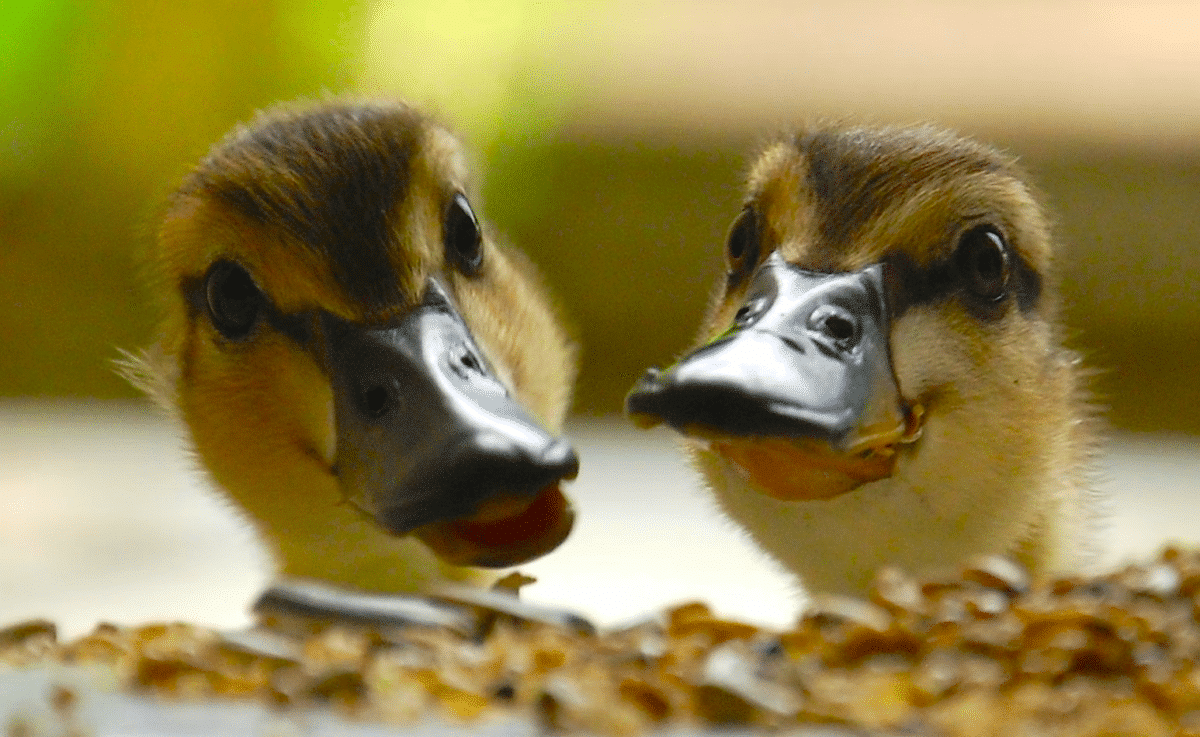
Taking care of baby ducks can be a rewarding experience, but it is important to prepare before bringing them home.
- Creating an enclosure with plenty of space for the ducklings to move around and enough shade and shelter.
- Provide nutritious food such as starter crumbs – a specially formulated duckling feed – along with treats like insects, slugs, and snails.
- Make sure the water is shallow enough. Your ducklings can drink it quickly but deep enough to allow them to paddle and splash.
- You’ll need to clean the enclosure regularly and ensure the ducklings are kept warm in cold weather.
With proper attention and care, you can raise happy, healthy ducks that will bring joy into your life for years to come.
Common Health Issues in Baby Ducks
Baby ducks are vulnerable to various health issues, which can be avoided with proper care.
- Common problems include fungal and bacterial infections, respiratory illnesses, parasites, and bacterial arthritis. Providing the ducklings with a clean living environment, fresh food and water daily, and ample exercise space can help prevent most diseases.
- Practicing proper husbandry techniques, should vaccinate baby ducks against common avian diseases to ensure optimal health and well-being.
- It is also essential to monitor for signs of distress, such as reluctance to eat or huddling together in one area; these may point to underlying issues that need attention from a veterinarian.
With proper care and prompt attention when necessary, baby ducks can thrive in their home environment and live happily for many years.
How Long Will Baby Ducks Stay With Their Parents?

Baby ducks are social creatures and form strong family bonds with their parents.
- Ducklings stay close to their mother or father until they reach adulthood, usually around two or three months.
- The parent duck provides protection, guidance, and care for its young during this period.
- The seasonal availability of food may determine the time that baby ducks remain with their parents since wild ducks migrate.
Once the young have reached maturity, they will start families- another cycle built upon instinctive family dynamics between ducks and other waterfowl species!
Building a Safe and Comfortable Habitat for Baby Ducks
Creating a safe and comfortable habitat for baby ducks is no small feat, but with the right tips, it’s easier than ever.
- To provide a healthy environment for the ducklings, start by ensuring their home offers plenty of space to roam and splash freely, away from potential predators.
- Ensure clean bedding and warm water for your ducks to bathe in, as cleanliness is essential for their well-being.
- Try covering the area with a mesh netting or protective covering of some kind – this will help keep them safe from pesky rats or other creatures looking for an easy snack.
- Provide plenty of nutritious food to get the proper nutrients they need to grow healthy and strong.
With these basic steps in mind, you’ll be well on your way to building a safe and comfortable habitat for your baby ducks!
Encouraging Socialization in Baby Ducks

As ducks naturally lead a communal lifestyle, it is important to immediately foster socialization in baby ducks.
- Early socialization helps baby ducks adapt quickly and build strong relationships with other community members.
- The most effective way to facilitate socialization is to expose baby ducks to age-corrected playmates at feeding times while they are still kept indoors.
- Spending quality time during these sessions also helps improve parent-duckling bonds and bring out positive behavior among the young ones.
- Appropriate enclosure sizes, proper introductions, and monitoring ducklings’ responses can all help encourage healthy group dynamics.
- Teaching them to be safe around other creatures is also an essential part of duckling rearing that requires supervision from a knowledgeable adult guardian.
With early investment, patience, and continued support, this process can ensure improved health, longevity, and happiness for all the members of your flock!
Tips for Raising Happy and Healthy Baby Ducks

Raising baby ducks can be a gratifying experience for anyone. You can take several steps to ensure your new ducklings remain happy and healthy.
First and foremost, providing them with a secure and safe living environment is important. Ensure their area is free of hazards, such as rats or other predators.
Additionally, providing them with a balanced diet of high-quality feed will help keep their energy levels high and support their overall development.
Furthermore, give them plenty of room to exercise, allowing them to stretch their wings and build essential muscles. Lastly, providing social interaction with other ducks and humans is necessary for keeping ducks fulfilled.
Following these tips will help you have the best experience raising baby ducks!
Learn more about Raising Ducks.
Importance of Monitoring Baby Duck Behavior
Monitoring baby duck behavior is incredibly important for both their safety and well-being. Ducks are very vulnerable when they’re young and can quickly become injured or even lost due to sudden fright, so we must watch them.
Earning trust from newborn ducks is also necessary so that they will stay close enough to be monitored and can be found again if needed. This form of positive reinforcement helps the mother duck feel at ease while away finding food and helps us ensure that the little ones are always safe and sound.
By observing their behavior, we can quickly identify if something is wrong, allowing us to intervene before any real danger arises. So if an extended family of baby ducks surrounds you, remember that careful monitoring is paramount!
Understanding The Behavioral Traits Of Baby Ducks
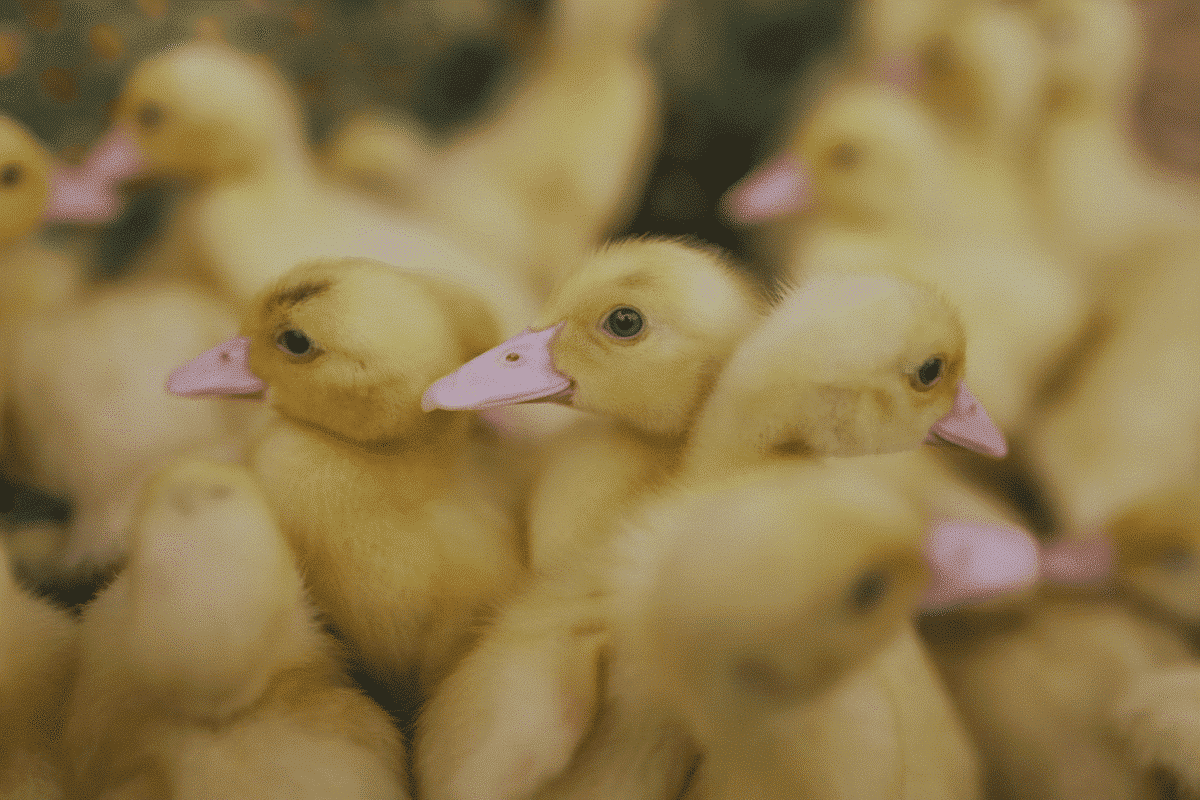
Understanding the behavior of baby ducks is essential for anyone raising them. These adorable, fluffy bundles of joy soon become independent and act differently than they did when they were first hatched.
To ensure your ducks are developing positively, it helps to familiarize yourself with the typical behaviors at each stage of their growth. At hatch, baby ducklings will be timid and easily startled, but over time they will explore their environment fearlessly, just like any other animal.
To monitor their physical development, you should pay attention to how well they swim and how active they are—ducks need lots of exercises! Not only that, but socializing is also crucial; it’s essential to make sure your little ones are being exposed to both human interaction and other ducks so they can learn vital flight and social behaviors from the flock. Your new arrivals will grow happy and healthy with some observation and love!
Reliable Information About Caring For Baby Ducks
You’re in the right place! A wealth of online resources is available to help you learn more about caring for hatchlings. Start with reputable websites dedicated to duck care, like The Spruce Pets, which offers nutrition, behavior, and health care tips.
Other helpful sites include Backyard Chickens and the University of Minnesota Extension. Also, remember to speak with a local veterinarian who is knowledgeable about the specific needs of ducks. With the proper knowledge, caring for baby ducks can be an enjoyable endeavor!
Wrapping up on Baby Ducks
In closing, adopting a pet baby duck can bring joy and companionship to your life. Whether you are an experienced duck owner or just getting started, keeping your little fluffers healthy and happy needs a bit of dedication.
With the basics of caring for pet baby ducks outlined in this guideline, you will be able to provide them with everything they need to thrive.
Baby ducks make great family pets, and their unique personalities and loving nature can fill your heart with warmth unlike anything else.
Also have a look at Exploring the World of Baby Hippos.
- Bald Eagle Family Expand Their Nest In California - April 24, 2024
- Firefighter Saves Abandoned Kittens Found Cuddling In Hoses - April 24, 2024
- Dolphins Get High Playing Catch With A Pufferfish - April 24, 2024

